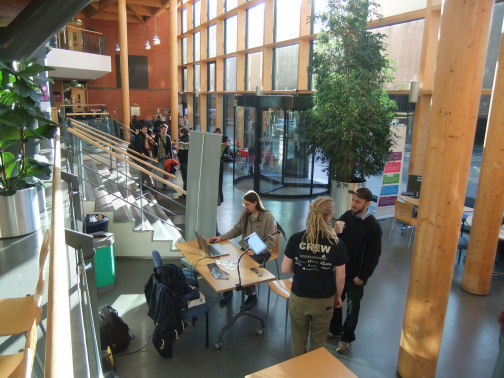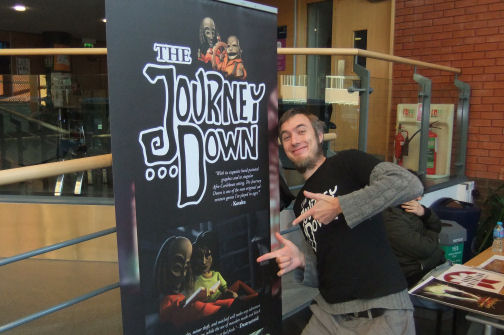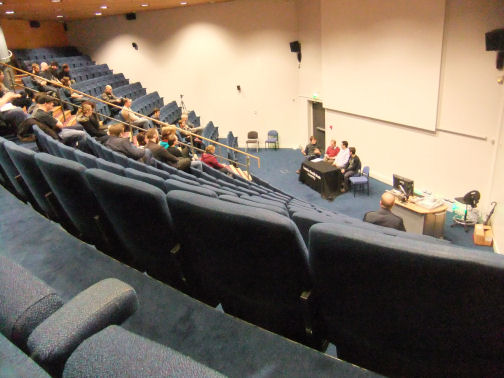Fourth AdventureX Convention
By Peter Rootham-Smith
The fourth AdventureX convention was held on December 6th and 7th 2014 at the South Bank University in London, a new venue. South Bank University is a very good, modern venue with plenty of space and a range of lecture and meetings rooms to hold events in." The venue was arranged courtesy of the University director of a Game Cultures course, and is close to the Elephant and Castle Tube station. In the local area there are plenty of eateries, and easy to get to using public transport.
The convention had multiple streams so there could be panels and talks and demonstrations going on in parallel in different rooms. In the foyer of the building, a number of game developers had set up tables to show their games as well, so there was plenty to see. The AdventureX convention is definitely smaller than E3, and more informal (the speakers and guests had labels with X on them rather than badges on lanyards.) But this means if you go, you can rub shoulders with everyone there. There aren’t the barriers there are at bigger events."

The convention organiser, Mark Lovegrove of Screen 7, had managed to organise a good range of speakers and guests. The names I was familiar with were Dave Gilbert of the Blackwell series fame, Kevin Mentz of Daedalic Entertainment, Josue Monchan who worked on the first “Runaway” game, Theodor Waern and Mathias Johansson of “The Journey Down” game, and Francisco Gonzalez of the recently published “A Golden Wake” game. There were lots of people there from the Adventure Game Studio (AGS) community, including Dave Gilbert himself of course.
Most of the games on show, I would place at the higher end of the hobbyist spectrum of game making, with a retro pixelated look. There is interesting work coming out of the AGS community (and from other hobbyists) -- innovation without the pressure of conforming to what sells -- but they’re not games I myself tend to play or have a wide knowledge of. Some of the games on show, despite coming from very small game developers, were attractive to look at. One such game is “The Adventures of Bertram Fiddle” from the four-person animation studio Rumpus, based in Bristol in the UK.

Theodor Waern
Kevin Mentz talked about the games he had done, or was doing, which all had two player characters. The forthcoming “The Devil’s Men” will be a novelty to play, as the the player characters will have opposing agendas, rather than be cooperating to achieve the same goal. He said that in “Memoria” there was a symmetry or anti-symmetry between what Geron does and what Sadja does. I didn’t notice this while playing, but perhaps such anti-symmetry doesn’t need to be consciously observed for it to affect the playing experience.

Kevin Mentz
Dave Gilbert did a talk about dialogue, and how he had come to realise that less is more as a result of player feedback -- a great example of a game developer responding to the players, and improving what they do. Dave is now an advocate of keeping dialogue under control, and I can think of many games with superfluous, verbose verbiage which just got well in the way of gameplay.

Dave Gilbert
There was a panel on branching in games (a popular theme at the moment with “Dreamfall Chapters” and others). But partly because of the range of people on the panel (Interactive Fiction to commercial graphic adventures), and partly because it is an evolving area of Adventure games, I’m not sure anything sensible came from the discussion. There are some big questions in there, like would you replay a game to get more of the gameplay, or do you just want to play a game once?

A guy called Jon Hare who was part of Sensible Software (they did games like soccer games) talked about his life as a software game developer since the 1980s. Even back then, publishers were not reliable at handing out royalties. The technology may have changed out of sight since those basic days, but human nature has not.
copyright © 1999-2014 GameBoomers